|
|
|
Sort Order |
|
|
|
Items / Page
|
|
|
|
|
|
|
| Srl | Item |
| 1 |
ID:
174551
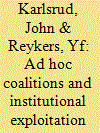

|
|
|
|
|
| Summary/Abstract |
While the increasingly thick web of global, regional and sub-regional security arrangements and institutions has received ample scholarly attention, the phenomenon of ad hoc military coalitions and how they impact these institutions has been relatively little explored. We examine ad hoc coalitions in international security responses and develop a tentative typology of military responses that takes ad hoc coalitions into consideration, where we differentiate in terms of institutionalisation and duration. Following a rational-choice institutionalist logic, we argue that institutional proliferation increases the chances of institutional exploitation. We illustrate this with how states apply a pick-and-choose approach in which institutional products but not frameworks are used. They use the interoperable forces, a common culture and mainstreamed doctrine, but not the formal deployment of rapid response mechanisms of eg the North Atlantic Treaty Organization and the African Union. In closing, we observe that institutional proliferation in international security facilitates a functionalist approach mainly inspired by national self-interest. Future research should examine whether this could result in dwindling relevance of international institutions, first in the domain of security, but later also in other domains.
|
|
|
|
|
|
|
|
|
|
|
|
|
|
|
|
| 2 |
ID:
191729
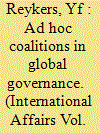

|
|
|
|
|
| Summary/Abstract |
Ad hoc coalitions (AHCs) are an indispensable but scantly conceptualized part of global governance. In recent years, several typologies and classifications of global governance arrangements have been provided, mostly differentiating them based on their organizational design features of degree of formality and membership composition. These do not capture AHCs and the role they play in global governance. In this article, we not only provide a conceptualization of AHCs, but also propose ways in which AHCs fit within the broader global governance architecture. We argue that what sets AHCs apart is not so much their (in)formality or membership, but rather their short-notice creation, their task-specific purpose and their temporarily circumscribed existence. We therefore define AHCs as autonomous arrangements with a task-specific mandate established at short notice for a limited time frame. We then develop a research agenda on the nature and future of AHCs, including their short- and long-term relationship with other multilateral arrangements in the global governance architecture. This is important, as we do yet not know how AHCs complement, compete and impact on international organizations and international crisis response.
|
|
|
|
|
|
|
|
|
|
|
|
|
|
|
|
| 3 |
ID:
190901
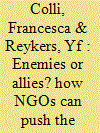

|
|
|
|
|
| Summary/Abstract |
This article examines the conditions under which non-governmental organisations (NGOs) gain access to defence administrations when campaigning for transparency around the use of military force. We theorise that gaining access in this traditionally secluded domain is a matter of supply and demand. NGOs can gain access through technical and political information, yet not without demand for these resources, dependent on the politicisation of concerns about the use of force. We focus on the activities of Airwars, an international NGO, and its campaign in the Netherlands (2015–20) to foster transparency about civilian casualties caused by Dutch airstrikes. Our analysis shows that their credible information about air strikes led to access to the defence administration and allowed them to effectively advocate for transparency, mediated by the politicisation of the issue through parliamentary and media attention. Our findings contribute both to the literature on NGO advocacy and to the field of civil-military relations.
|
|
|
|
|
|
|
|
|
|
|
|
|
|
|
|
| 4 |
ID:
156091
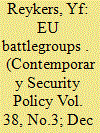

|
|
|
|
|
| Summary/Abstract |
This article reviews the gloomy saga of the EU Battlegroups, focusing on four questions: Where do they come from? What do they look like? What have they been hindered by? And where do they go from here? It builds upon earlier findings in the literature and adds novel insights based on original data. In doing so, the article pays particular attention to the standby nations’ constant calculation of political and financial costs. It argues that recognizing these cost–benefit calculations allows for identifying the most crucial areas to be tackled to make the EU Battlegroups functional. In addition, the article stresses that these considerations play out in a setting wherein the Battlegroups are just one among many policy instruments available for rapid response.
|
|
|
|
|
|
|
|
|
|
|
|
|
|
|
|
| 5 |
ID:
160935


|
|
|
|
|
| Summary/Abstract |
Is the United Nations Security Council (UNSC) capable and willing to hold accountable the forces which it authorizes? Although it is an often-voiced recommendation that the UNSC should step up its accountability efforts, such as by installing more strict reporting requirements to avoid mission creep, evaluations of the effectiveness thereof remain largely absent. This article suggests that a combination of process-tracing methods with insights from principal–agent theorization allows for systematically evaluating the UNSC’s efforts and capacity to hold accountable non-UN-led forces which it authorizes with a forceful mandate. Such an approach makes it possible to evaluate the causal relevance of particular accountability mechanisms, including reporting requirements, for avoiding mission creep. This is illustrated by an analysis of the NATO-led intervention in Libya of 2011. It is shown how a process-tracing assessment can lead to conclusions about the ineffectiveness of reporting requirements when a permanent member is involved in mandate implementation. The article concludes by calling for more systematic research into the importance of the implementer’s identity for explaining UNSC accountability efforts towards non-UN-led forces.
|
|
|
|
|
|
|
|
|
|
|
|
|
|
|
|
| 6 |
ID:
156088


|
|
|
|
|
| Summary/Abstract |
Military rapid response mechanisms are generally understood as troops that are on standby, ready to be deployed to a crisis within a short time frame. Yet, the overall track record of the existing multinational rapid response mechanisms within the European Union, the African Union, and North Atlantic Treaty Organization remains disappointing, and the United Nations does not even have a rapidly deployable capacity anymore. Meanwhile, despite that calls for the further development of these mechanisms are still being voiced politically, scholarly literature remains fragmented. This is problematic as many of the obstacles faced by these organizations are similar. This forum uniquely compares experiences from the four aforementioned organizations. Drawing on these insights, this introductory article identifies some key factors that hamper or enable the development and deployment of multinational rapid response mechanisms.
|
|
|
|
|
|
|
|
|
|
|
|
|
|
|
|
| 7 |
ID:
146998
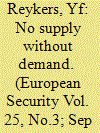

|
|
|
|
|
| Summary/Abstract |
Although the sad track record of the EU Battlegroups has attracted considerable scholarly attention, analyses have largely focused on obstacles related to the provision of the Battlegroup troops and to the consensus within the EU Council, hence taking a supply-side perspective. This article calls for complementing this perspective with an analysis of the demand for their deployment. That implies analysing whether and why the EU Battlegroups were (not) considered as an option by those actors taking the initiative to intervene in a particular crisis. Applying a rational-institutionalist approach, this article explains the absence of the Battlegroups from three recent crises: Libya (2011), Mali (2013) and the Central African Republic (2013–2014). Using data from document analysis and elite interviews, it shows that once a rapid military reaction became urgent, the EU Battlegroups were not even considered as an option by those initiating an international reaction.
|
|
|
|
|
|
|
|
|
|
|
|
|
|
|
|
| 8 |
ID:
186199


|
|
|
|
|
| Summary/Abstract |
While a comprehensive body of research provides evidence that politics does not always stop at the water’s edge, the question “when does politics stop at the water’s edge” has remained largely unanswered. This article addresses this gap in the literature by examining the level of agreement in Belgium’s parliament on military deployment decisions. More specifically, the uncontested decisions to participate in the 2011 Libya intervention and the air strikes against the self-proclaimed Islamic State in Iraq are compared with the contested decision to participate in strike operations against IS over Syrian territory. The results of our study indicate that a broad parliamentary consensus will emerge if the domestic political context forces left- and right-leaning parties into negotiating a compromise that takes into account their preferences regarding the scope of the operation and if left-leaning parties have no reason to oppose the operation because it pursues inclusive goals and its international legal justification is not contested.
|
|
|
|
|
|
|
|
|
|
|
|
|
|
|
|
| 9 |
ID:
173942
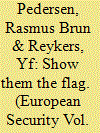

|
|
|
|
|
| Summary/Abstract |
Why do small states actively contribute to US- and NATO-led military operations? The small state literature has recently developed a novel explanation, referring to their dependency upon the alliance hegemon. The logic is that the small states aim to improve their status and reputation in order to remain relevant and to receive protection. This article contributes to this literature by moving away from this fear of abandonment motivation towards more positive status incitements. It shows how such status motives actually guide and shape small states’ military contributions in US- or NATO-led operations. It does so by using recent innovations in process-tracing methodology to create a status-seeking mechanism. Using the case of Belgium’s participation in the military coalition against ISIL, this article goes beyond the usual Scandinavian suspects in the small state literature and demonstrates that status motivations have relevance for a wider group of small states.
|
|
|
|
|
|
|
|
|
|
|
|
|
|
|
|
| 10 |
ID:
181636
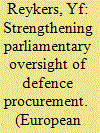

|
|
|
|
|
| Summary/Abstract |
This paper asks: to what extent can a dedicated or special committee with access to classified information empower parliaments to oversee major defence procurement decisions? These decisions often involve a mixture of political, military, economic and societal interests. Particularly after episodes of contestation or controversy, questions tend to arise about how to empower parliaments. The central argument in this paper is that being institutionally empowered and incentivised does not guarantee rigorous oversight. The availability of expertise is an oft-ignored factor in studies of parliamentary oversight. An analysis of oversight behaviour by the Belgian Federal Parliament during the acquisition of new fighter jets (2015–2018) shows that members of parliament also need to be capable of mobilising the necessary expertise in order to translate technical information in such a way that it allows them to influence decision-making, which is often executive-dominated. In this way, this paper contributes to managing expectations about the capacity of parliaments to cope with complex military problems.
|
|
|
|
|
|
|
|
|
|
|
|
|
|
|
|
|
|
|
|
|